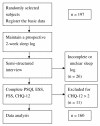Effects of an irregular bedtime schedule on sleep quality, daytime sleepiness, and fatigue among university students in Taiwan
- PMID: 19615098
- PMCID: PMC2718885
- DOI: 10.1186/1471-2458-9-248
Effects of an irregular bedtime schedule on sleep quality, daytime sleepiness, and fatigue among university students in Taiwan
Abstract
Background: An irregular bedtime schedule is a prevalent problem in young adults, and could be a factor detrimentally affecting sleep quality. The goal of the present study was to explore the association between an irregular bedtime schedule and sleep quality, daytime sleepiness, and fatigue among undergraduate students in Taiwan.
Methods: A total of 160 students underwent a semi-structured interview and completed a survey comprising 4 parts: Pittsburgh Sleep Quality Index (PSQI), Epworth Sleepiness Scale (ESS), Fatigue Severity Scale (FSS), and a rating of irregular bedtime frequency. Participants were grouped into 3 groups in terms of irregular bedtime frequency: low, intermediate, or high according to their 2-week sleep log. To screen for psychological disorders or distress that may have affected responses on the sleep assessment measures, the Chinese health questionnaire-12 (CHQ-12) was also administered.
Results: We found an increase in bedtime schedule irregularity to be significantly associated with a decrease in average sleep time per day (Spearman r = -0.22, p = 0.05). Multivariate regression analysis revealed that irregular bedtime frequency and average sleep time per day were correlated with PSQI scores, but not with ESS or FSS scores. A significant positive correlation between irregular bedtime frequency and PSQI scores was evident in the intermediate (partial r = 0.18, p = 0.02) and high (partial r = 0.15, p = 0.05) frequency groups as compared to low frequency group.
Conclusion: The results of our study suggest a high prevalence of both an irregular bedtime schedule and insufficient sleep among university students in Taiwan. Students with an irregular bedtime schedule may experience poor sleep quality. We suggest further research that explores the mechanisms involved in an irregular bedtime schedule and the effectiveness of interventions for improving this condition.
Figures
Similar articles
-
Sleep Quality and its Daytime Effects among University Students in the UAE.Oman Med J. 2024 Mar 31;39(2):e612. doi: 10.5001/omj.2024.61. eCollection 2024 Mar. Oman Med J. 2024. PMID: 38988796 Free PMC article.
-
Construct validity and factor structure of the pittsburgh sleep quality index and epworth sleepiness scale in a multi-national study of African, South East Asian and South American college students.PLoS One. 2014 Dec 31;9(12):e116383. doi: 10.1371/journal.pone.0116383. eCollection 2014. PLoS One. 2014. PMID: 25551586 Free PMC article.
-
Morningness-eveningness and daytime functioning in university students: the mediating role of sleep characteristics.J Sleep Res. 2017 Apr;26(2):210-218. doi: 10.1111/jsr.12467. Epub 2016 Oct 19. J Sleep Res. 2017. PMID: 27758010
-
Fatigue, sleepiness and sleep quality are SARS-CoV-2 variant independent in patients with long COVID symptoms.Inflammopharmacology. 2023 Dec;31(6):2819-2825. doi: 10.1007/s10787-023-01190-4. Epub 2023 Apr 5. Inflammopharmacology. 2023. PMID: 37020055 Free PMC article. Review.
-
Causes and consequences of sleepiness among college students.Nat Sci Sleep. 2014 Jun 23;6:73-84. doi: 10.2147/NSS.S62907. eCollection 2014. Nat Sci Sleep. 2014. PMID: 25018659 Free PMC article. Review.
Cited by
-
Sleep patterns and quality during summer and academic year among female university students.Neurosciences (Riyadh). 2024 Oct;29(4):252-261. doi: 10.17712/nsj.2024.4.20240024. Neurosciences (Riyadh). 2024. PMID: 39379085 Free PMC article.
-
Prevalence and related factors of sleep quality among Chinese undergraduates in Jiangsu Province: multiple models' analysis.Front Psychol. 2024 Apr 10;15:1343186. doi: 10.3389/fpsyg.2024.1343186. eCollection 2024. Front Psychol. 2024. PMID: 38659684 Free PMC article.
-
Sleep Duration and Sleep Patterns in Chinese University Students: A Comprehensive Meta-Analysis.J Clin Sleep Med. 2017 Oct 15;13(10):1153-1162. doi: 10.5664/jcsm.6760. J Clin Sleep Med. 2017. PMID: 28859718 Free PMC article.
-
Effects of a selective educational system on fatigue, sleep problems, daytime sleepiness, and depression among senior high school adolescents in Taiwan.Neuropsychiatr Dis Treat. 2015 Mar 19;11:741-50. doi: 10.2147/NDT.S77179. eCollection 2015. Neuropsychiatr Dis Treat. 2015. PMID: 25834449 Free PMC article.
-
The mediating role of cognitive arousal in the relationship between impulsivity and sleep quality among college students: a random intercept cross-lagged panel analysis.Sci Rep. 2025 Mar 10;15(1):8283. doi: 10.1038/s41598-025-90673-1. Sci Rep. 2025. PMID: 40064985 Free PMC article.
References
-
- Jefferson CD, Drake CL, Scofield HM, Myers E, McClure T, Roehrs T, Roth T. Sleep hygiene practices in a population-based sample of insomniacs. Sleep. 2005;28:611–615. - PubMed
-
- Guedes BM, Soares V, Carlos WJ. Impact of sleep hygiene on patients with obstructive sleep apnoea syndrome. Rev Port Pneumol. 2006;12:147–176. - PubMed
MeSH terms
LinkOut - more resources
Full Text Sources
Medical


